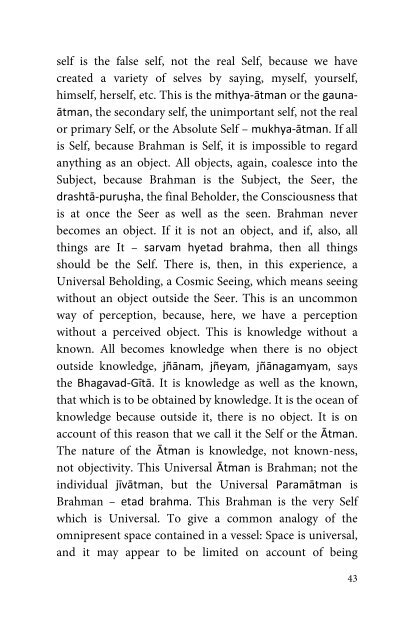Mandukya_Upanishad
Mandukya_Upanishad
Mandukya_Upanishad
Create successful ePaper yourself
Turn your PDF publications into a flip-book with our unique Google optimized e-Paper software.
self is the false self, not the real Self, because we havecreated a variety of selves by saying, myself, yourself,himself, herself, etc. This is the mithya-ātman or the gaunaātman,the secondary self, the unimportant self, not the realor primary Self, or the Absolute Self – mukhya-ātman. If allis Self, because Brahman is Self, it is impossible to regardanything as an object. All objects, again, coalesce into theSubject, because Brahman is the Subject, the Seer, thedrashtā-puruṣha, the final Beholder, the Consciousness thatis at once the Seer as well as the seen. Brahman neverbecomes an object. If it is not an object, and if, also, allthings are It – sarvam hyetad brahma, then all thingsshould be the Self. There is, then, in this experience, aUniversal Beholding, a Cosmic Seeing, which means seeingwithout an object outside the Seer. This is an uncommonway of perception, because, here, we have a perceptionwithout a perceived object. This is knowledge without aknown. All becomes knowledge when there is no objectoutside knowledge, jñānam, jñeyam, jñānagamyam, saysthe Bhagavad-Gītā. It is knowledge as well as the known,that which is to be obtained by knowledge. It is the ocean ofknowledge because outside it, there is no object. It is onaccount of this reason that we call it the Self or the Ātman.The nature of the Ātman is knowledge, not known-ness,not objectivity. This Universal Ātman is Brahman; not theindividual jīvātman, but the Universal Paramātman isBrahman – etad brahma. This Brahman is the very Selfwhich is Universal. To give a common analogy of theomnipresent space contained in a vessel: Space is universal,and it may appear to be limited on account of being43



